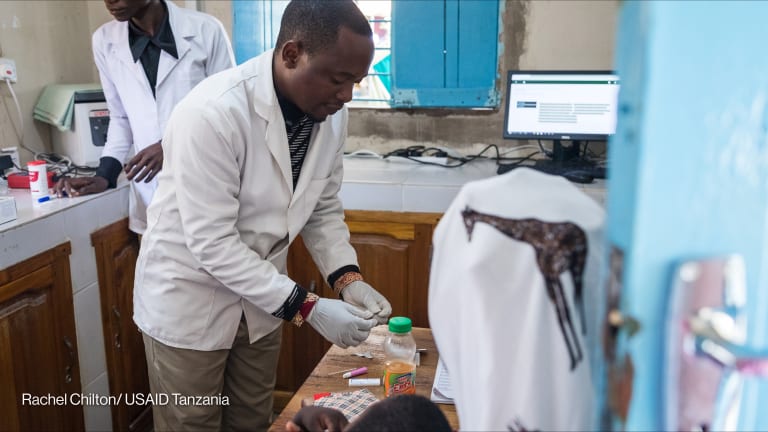
In 1918, a mysterious disease swept the globe, infecting one-third of the world’s people and claiming more than 50 million lives. Today, we know this virus as Spanish influenza, infamous for catalyzing the deadliest pandemic in modern history.
One hundred years later, we still don’t know exactly where or how the disease originated, or why it was significantly more lethal than its predecessors. However, what’s clear is that we still live in a world where infectious diseases can emerge and rapidly spread without warning, with immense costs to humans and countries. HIV/AIDS has caused 39 million deaths to date, SARS cost the economies of Asia more than $16 billion, and Ebola and Zika reminded us that in today's globalized world, an outbreak anywhere can have consequences for everyone, everywhere.
The rise of drug-resistant infections is complicating the challenge. While antibiotics have been a silver bullet for humanity since they were first discovered in 1928, we’re now facing the prospect of a world where they no longer work. More and more diseases are showing resistance to multiple drugs, making them increasingly difficult and expensive — and in some cases impossible — to treat. Antimicrobial resistance is on track to be the world’s biggest killer by 2050, when it will claim more than 10 million lives every year.
The situation is bleak, but not all hope is lost. By pairing investments in research and development with efforts to strengthen health systems from the bottom up, we can dramatically improve our ability to counter future outbreaks.
There’s already been growing recognition that we need to invest in new medicines and tools to protect us against emerging diseases and drug-resistant infections, including with the launch of the Coalition for Epidemic Preparedness Innovations, which aims to develop vaccines for deadly viruses before epidemics strike. We now have an Ebola vaccine that’s 100 percent effective, efforts to develop a Zika vaccine are underway, and two reports published alongside the World Economic Forum last month highlight new commitments by the pharmaceutical industry to develop medicines and diagnostics to fight antimicrobial resistance.
Yet, while these investments in research and development are encouraging, if history is any indication, they won’t be enough. Some of the deadliest diseases are the ones that emerge without warning. Having diagnostics, medicines, and vaccines to fight the diseases we know of won’t prepare us to combat the next unknown killer that lurks behind a corner.
When it comes to fighting infectious diseases, the best offense is a strong defense. By building strong and resilient health systems at scale, we can maximize our chances of being prepared for the next pandemic, regardless of where or when it hits.
Strong health systems prepare us to fight pandemics in three key ways:
First, countries need to have strong monitoring and surveillance systems in order to have any chance of catching deadly diseases as they emerge. When Ebola swept West African countries, they didn’t have the surveillance systems required to detect it immediately. As a result, the disease circulated undercover for months and by the time it emerged, it took an enormous international effort to stem the tide. In contrast, Nigeria 00 a country with a strong surveillance system in place thanks to the global polio program — was able to utilize existing surveillance infrastructure when Ebola entered its borders. The result? Ebola claimed only eight lives in Nigeria.
Second, improved laboratory and technical capacities are necessary to make quick diagnoses — which is especially imperative in the midst of pandemics. Without sufficient local capacity to test blood samples, the entire process of disease diagnosis is slowed down, costing critical time in situations where time is of the utmost essence. For example, in recent years we’ve seen that inadequate laboratory capacity is a major barrier to identifying antimicrobial resistance, which results in the inappropriate use of antibiotics, further compounding the problem.
Finally, a strong and capable health workforce is the cornerstone of a resilient health system that can successfully respond to disease outbreaks. Although Middle East Respiratory Syndrome took South Korea by surprise in 2015, the country was eventually able to mobilize its strong health workforce and contain the majority of cases to hospitals, preventing the disease from spreading further. Yet, many countries don’t have the same capacity; the global shortage of health workers is expected to be 14 million by 2030, with low- and middle-income countries facing the greatest shortfalls.
New tools and technologies can help us strengthen health systems in these critical ways. For example, with support from Gavi, the United Nations Development Programme is working with the government of India on the scale up of a technology-driven solution, electronic vaccine intelligence network (eVIN), for strengthening the effectiveness of vaccination systems in multiple states. This initiative is also being expanded across India and to a number of other countries. Other organizations are using data and analytics tools to improve surveillance of diseases such as malaria, and mobile technology to train the health workforce.
This week, global health experts and leaders are coming together at the Prince Mahidol Award Conference in Bangkok, Thailand, calling for action to protect the world against the threat of emerging infectious diseases. As countries develop policies and capacities to counter pandemics, let’s not forget that research and development, while important, is insufficient on its own. Building strong health systems and technical capacity is critical to prepare for emerging threats, including diseases that may not exist yet.
We may not know exactly when the next outbreak will strike, but experts agree that the world is at risk of another major pandemic, potentially even one rivaling the Spanish influenza of 1918. In today’s world where diseases don’t abide by borders, global health systems are only as strong as the weakest link. Investing in strong health systems is our best bet to protect ourselves and stop local outbreaks before they turn into global pandemics.
Read more Devex coverage on global health.
Read more stories on global health:
▶ 'What worries me is not the money for WHO' — Tedros
▶ '18 months in, how is WHO's health emergencies program working?
▶ 'DRC health minister: Alignment, focus on results, and private sector are critical
▶ 'Opinion: Better health means better security — and more sustainable development








